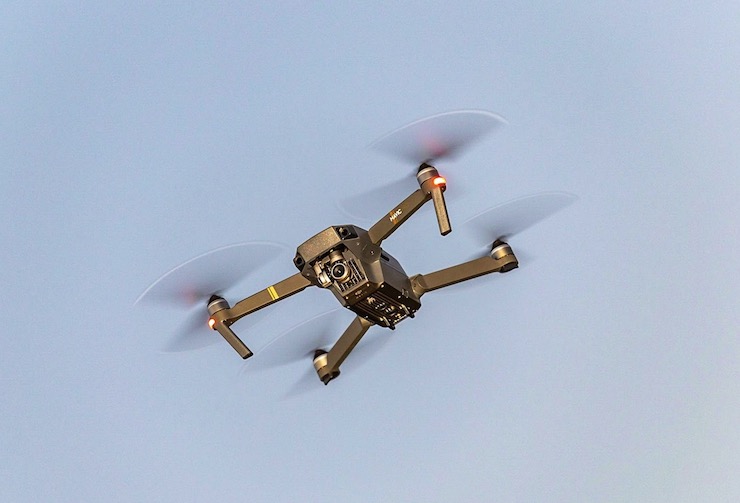Hydrogen Powered Drones Can Fly Up to 3 Times Longer than Lithium Batteries With Zero Emissions

On May 6, 1937 the Hindenburg attempted to land over a field in Manchester Township, NJ. As the giant air ship came in for a landing something went horribly wrong. A fire erupted and the craft crashed down killing 35 of the 97 people on board the ship and one ground worker. There are many theories as to what caused this accident, but the main conclusion is that a static spark ignited the Hindenburg’s hydrogen fuel. As the most abundant element in the universe, hydrogen is also one of the most highly combustible elements. Sine the Hindenburg tragedy tremendous leaps have been made in the field of aviation and the fuel sources used to power aircraft. So much progress has been made that there are some who are now finding ways to once again use hydrogen to provide fuel for aircraft, specifically drones.
Dr. Enass Abo-Hamed found a way to store hydrogen as a stable solid without compression as part of her PhD studies at the University of Cambridge in London. With this new hydrogen concept, termed “The Hydrogen Sponge”, she founded H2Go Power, a company that provides “Zero-emission solid-state hydrogen storage solution.” Dr. Abo-Hamed created 3D printed aluminum tubes that sit inside a drone’s gas chamber. Within these tubes the hydrogen gas stays in a stable solid state, The Hydrogen Sponge, until a coolant is pumped into the tubes. Once this coolant is introduced it warms the hydrogen and passes it into one side the drone’s fuel cell, freeing electrons and creating energy. Oxygen is pumped into the other side of the drone’s fuel cell joining with the leftover positively charged hydrogen atoms. The remaining waste is water vapor. This powers the drone with zero emissions.
Not only is this a clean way to power a drone, but it also gives a drone an extended flight time. Battery life time is always an issue when it comes to drones. The average drone can only support a battery that allows is 20-30 minutes of flight time. The fuel cell created by Dr. Abo-Hamed is light weight and can give a drone 3 times the flight time of an Li-ion battery powered drone. H2Go’s hydrogen powered drones can fly for upwards of 90 minutes and still carry an additional payload. When the fuel runs out there is no need to wait for the battery to recharge, simply switch out the fuel cell. Dr. Abo-Hamed said, “The cutting-edge design allows for up to 15 percent of total drone weight reduction and volume control – achieved by the 3D printed lightweight metal – as well as creating internal structures that optimize heat management into and out of the power system. This enables UAVs to travel three to five times further and carry heavier payloads. This is a hugely exciting development for our unique technology and brings us a step closer to delivering clean and sustainable energy delivery.” On top of that, because the hydrogen is stored in a stable form with only water vapor as waste it is safer than a typical drone battery if a crash were to happen.
Another British company, Intelligent Energy, has also been working with hydrogen based fuels. For the last 30 years Intelligent Energy has been dedicated to the design of fuel cells for stationary power, automobiles, and UAVs. They have designed a hydrogen fuel tank that is similar to Dr. Abo-Hamed’s, only it doesn’t store hydrogen in a solid state. As explained on their website, “Intelligent Energy’s air cooled fuel cell systems run on hydrogen and ambient air to produce clean DC power in a simple, cost-effective, robust and lightweight package. They have a higher energy to mass ratio than battery based systems and can be refueled in a few minutes.” Recently Intelligent Energy attached their 800W Fuel Cell Power Module to a modified DJI Matrice100 to set a new Guinness World Record for the longest multi-rotor flight time. The previous record was for 2 hours, 6 minutes, and 7 seconds. With their hydrogen powered drone, Intelligent Energy blew the record away with a flight time of 12 hours, 7 minutes and 5 seconds.
Lee Juby, Chief Sales Officer for Intelligent Energy said, “We have the lightest and most power dense fuel cells available on the market and we continue to design new and innovative products to ensure we are leading the way in fuel cell power for commercial UAVs.” Both companies are in the process of making these fuel cells available to commercial drone operators. They see these hydrogen powered drones benefiting those who use drones for agriculture, surveying, and emergency work. By finding a way to safely utilize hydrogen for fuel these companies are extending the flight time of drones while also helping reduce carbon emissions to protect the environment. Dr. Abo-Hamed made a great point about how she hopes her hydrogen fuel cell will be used in the future. She said, “My dream really is not just to make drones. Maybe in the next twenty or thirty years we could de-carbonise air travel, which is something really important for our climate.”
|